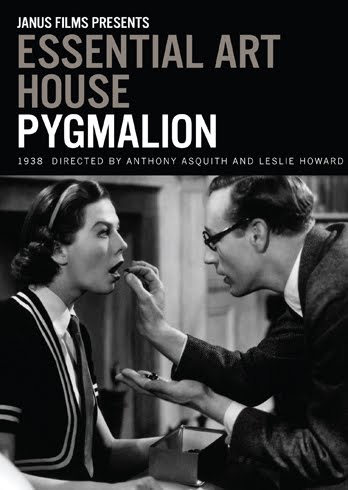by Yayaati Joshi
[box]Bringing in the retro touch to the theme, ‘Time Machine,’ Yayaati Joshi takes us back in time, offering an interesting perspective on ‘Pygmalion’ – a movie adapted from George Bernard Shaw’s play.[/box]Some of the best films have been those that have adapted screenplays from films or books. Not to say that original scriptwriting in the filmmaking business is awful, but a tried and tested script is usually the producer’s delight –he knows that the plot has been successful, and doesn’t mind spending money on something that seems to be a ‘safe investment’.
Pygmalion, released in 1938, is one such film. Adapted from George Bernard Shaw’s play, it tells the story of a phonetics professor who bets that he can refine the Cockney accent of a plebeian girl, to such an extent that she can pass off as a Duchess. In today’s time, when, as movie-watchers, we’ve been subject to the most unlikely romances – of teachers and students, incest driven cousins, and even captives suffering from the Stockholm syndrome, it isn’t unlikely to rule out the possibility of a developing romance between the professor and the cheerful, but downtrodden girl. But back then, I wonder, how many people (who were unfamiliar with the script) would have thought that two diametrically opposite characters could fall in love!
In a scene which seems as rugged, messy and unkempt as Eliza Doolittle (played by Wendy Hiller), we’re introduced to her – loud voice, clumsy body language and crude laughter – her demeanour is far too churlish to be modified. But when she’s introduced to us as the flower selling girl, we’re unaware of what’s about to happen next. In the same scene, with a small notepad and pencil, carefully observing, with measured steps, and comporting behaviour – a man has been overhearing the chatter around him. Occasionally, he makes notes too. Till he is introduced to us, he looks more like an investigative journalist than like a professor. And the dramatic moment, in which the professor (played by Leslie Howard) and Eliza meet, is delightful – even though Eliza seems to be on the receiving end. “That ain’t proper writing”, Eliza remarks, scared that something about her is being written down. Professor Higgins, as he is known, looks at her with the cold, uninterested expression of a butcher – looking at her as if she was a hen about to be slaughtered. Slaughter he must, and slaughter he will.
This opening scene is important in many ways. It indicates, in a short time, the dispositions and temperaments of the main characters. Eliza is a bit of a drama queen – although she uses that streak to save herself of accusations of disrespecting a gentleman. Higgins himself is a bit of an attention seeking man – claiming to recognise accents and cadences, and their origin, he quickly ‘steals the show’ from the howling girl by telling people where they’re from by their accents. When the eventual course of the plot is made known, we already know that both Eliza and Higgins are going to have a hard time tolerating each other.
As the process of ‘changing’ Eliza’s accent and behaviourism begins, the idea of her being unable to pull it off seems likely. As expected, Higgins is a hard task master, and his exercises with her seem to be too much of a strain for her to take. Up to this point, who would have imagined the two most unlikely ‘love birds’ would flock together? But as time passes by, we see Higgins reaching his goal – and in a brilliantly shot scene. Higgins does pass her off as a Duchess. As she walks in, in her white gown – slow steps, low voice, and a veneer of gentility, behind which is hidden the harsh reality of her humble origin, she arrests everyone’s attention. Playing the puppet, Eliza exceeds Higgins’s expectations and “performs” brilliantly. Everyone who meets her is charmed. But is that charm enough to melt her tutor’s cold heart?
After the show of snobbery is over, Higgins and his aide, along with Eliza, come back home – the men satisfied with their success, the woman puzzled about her future. She’s seen how the rich behave – she’s passed off as a lady herself – but what is she to do now? Go back to selling flowers? Like an innocent schoolgirl who waits for her result to be declared, she listens to the conversation of the men. Higgins remarks, “No more artificial duchesses for me,” and with that, Eliza wilts like a flower. But within her, a frustrated woman pushes her to confront her master, and she does. “What’s to become of me?” she demands Higgins, who rebukes her saying that he doesn’t care what becomes of her. This sense of existential crisis that Eliza suffers from is understandable – she’s not good to do anything but sell flowers, and having had a taste of the rich life, it would be hard for her to revert to her old ways. Who is she to be, really? A fake duchess? A flower seller? Or the subject of a haughty professor’s research?
After many more confrontations and endless bickering, Eliza and Higgins unite. But do they really? The last thing that Higgins says to her is “Where the devil are my slippers, Eliza?” indicating that he still wishes to treat her as a maid. At the end of the film, due to a love-hate relationship between the professor and her pupil, it remains unknown to us whether they lived happily ever after or whether the poor girl was trampled over by Higgins for the rest of her life. But that forms for a perfect ending – the two kissing and making up would have been way too sappy, or more Bollywood like, should I say?
Yayaati Joshi is a man with simple tastes and intense beliefs. Contrary to the bling associated with the capital city, he prefers the company of close friends, an engaging book or an Alfred Hitchcock movie. His placid demeanour is often mistaken for reticence; Yayaati is a self- proclaimed loner, whose recent pursuits include his foray as a budding writer. Yayaati blogs at http://rantingsofadelusionalmind.wordpress.com
[button link=” https://sparkthemagazine.com/wp-content/uploads/2011/12/spark-december-2011.pdf” color=”black” newwindow=”yes”] Read all the articles at one place! Download the PDF! [/button] [button link=”http://issuu.com/sparkeditor/docs/spark-december-2011?mode=embed&layout=http%3A%2F%2Fskin.issuu.com%2Fv%2Fcolor%2Flayout.xml&backgroundColor=000000&showFlipBtn=true” color=”green” newwindow=”yes”] Get the print mag feel. Flip and read on the e-reader![/button]
[facebook]Share[/facebook] [retweet]Tweet[/retweet]









Didn’t know there was an earlier version of the 1964 film “My Fair Lady” … and one more version due next year! In the original play, Shaw alludes to the aftermath through those famous lines: “Galatea never does quite love Pygmalion …” Eliza going on to marry Freddy and not Prof. Higgins.
Wonderfully written. As a novice movie buff, I havent been able to see the classics as much as i wish to. But this article certainly has captured my attention with its precise and deeply simple pace and subject. Kudos to Yaayati.